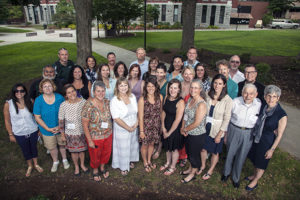
In the past decade, more than 200 high school teachers from around the country have traveled to Clark during the summer to attend the annual Lee Gurel American Psychological Association–Clark University Workshop for High School Teachers. This year, participants left the workshop with new contacts, textbooks and posters, and some took with them something a bit more personal: a “selfie” with the “Father of Psychoanalysis” himself, Sigmund Freud. Several participants headed to Clark’s Red Square to pose with Freud’s life-sized bronze statue, and posted their photos to Pinterest and Instagram. Workshop attendees also shared their thoughts about the workshop via social media.
“…A fantastic few days at Clark — great people and great information,” participant Leslie Woodworth, of Lenape Valley Regional High School in New Jersey, posted on Twitter. Sara Floyd, of Ozark High School in Missouri, posted, “Thank you so much for all the great ideas this week.” More tweets and photos can be found by searching #APAatClark.
For 10 years, the APA Education Directorate and the APA Teachers of Psychology in Secondary Schools (TOPSS) have collaborated with the University to develop the workshop; workshops feature presentations on timely topics by TOPSS members and Clark psychology professors. This year, lectures were given by Psychology Professor Michael Addis (on men’s mental health), Psychology Professor Wendy Grolnick (on motivation) and by the director of Clark’s Hiatt Center for Urban Education, Katerine Bielaczyc (on human learning).
Mary Kite, professor of psychology at Ball State University delivered the keynote address, “Developing Students’ Multicultural Competence: Practical Advice for Difficult Dialogues,” and Randy Ernst, of Lincoln Public Schools (Nebraska), and Nancy Fenton, of Adlai E. Stevenson High School (Illinois), provided attendees with recommendations for classroom activities that engage high school students in inquiry-based learning about psychology.
“The Clark workshop has become our flagship professional development event for high school psychology teachers. APA recognizes how important high school psychology classes are for teaching the next generation about psychological science,” said Emily Leary Chesnes, assistant director of Precollege and Undergraduate Education at the APA. “This workshop provides teachers with an incredible opportunity to network with each other and learn from the experts.”
Workshop participants also visited the University Archive to see significant historical documents, view the place where the APA was founded back in 1892, and toured several psychology laboratories.
“This workshop is one of the few that provide high school teachers the opportunity to both sharpen pedagogy and learn about cutting–edge research. We are proud to play a part in this collaboration, and expect to continue to host this important event in the future. Clark has a distinguished history with the development of the field of psychology, and our faculty are able to demonstrate how we are linking teaching and research in innovative ways,” said Associate Provost and Dean of Research Nancy Budwig.
The idea for a workshop for high school teachers grew from the vision and generosity of Clark alumnus Dr. Lee Gurel, who studied psychology and was granted a bachelor’s degree from Clark in 1948. The workshop is co-sponsored by the American Psychological Foundation, Clark University, and APA.
“In exploring collaboration of the two institutions so important to me, I saw a way to repay a massive debt—the debts I owed to education in general and Clark in particular, to the profession, and to the many wonderful teachers who have contributed so much to my life,” said Dr. Gurel.
The American Psychological Association, in Washington, D.C., is the largest scientific and professional organization representing psychology in the United States and is the world’s largest association of psychologists. Through its divisions in 54 subfields of psychology and affiliations with 60 state, territorial and Canadian provincial associations, APA works to advance the creation, communication and application of psychological knowledge to benefit society and improve people’s lives.
related link: http://news.clarku.edu/news/2009/10/29/500000-gift-intensifies-clarks-focus-on-urban-education/


